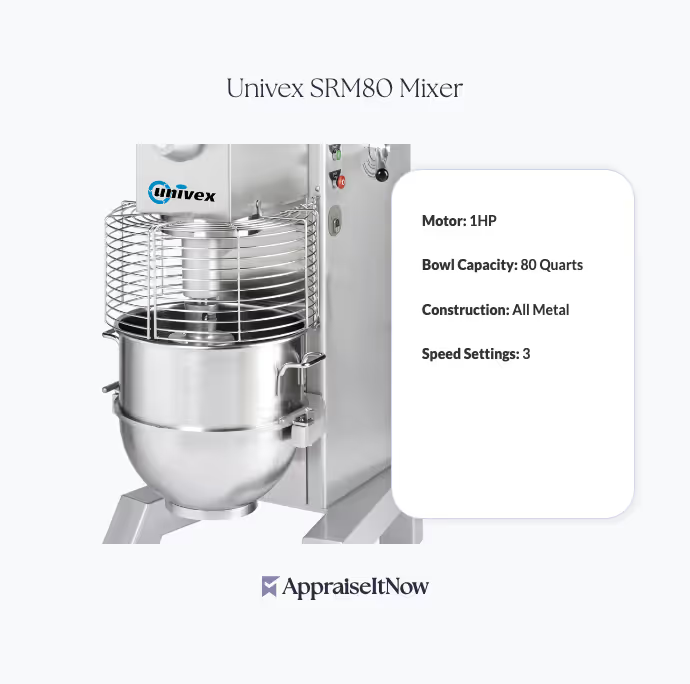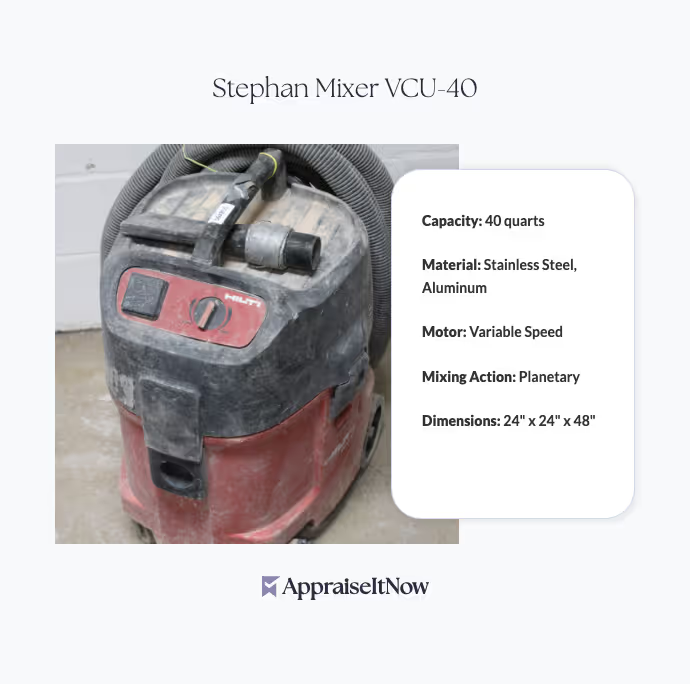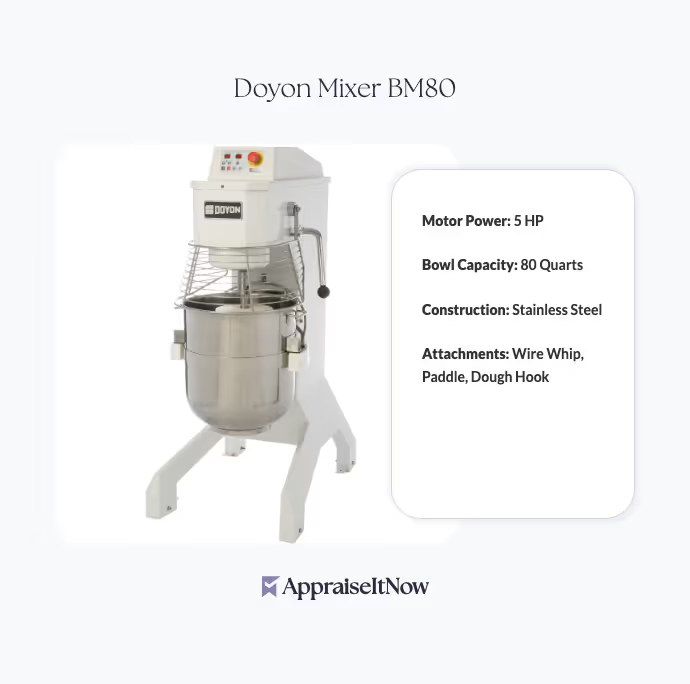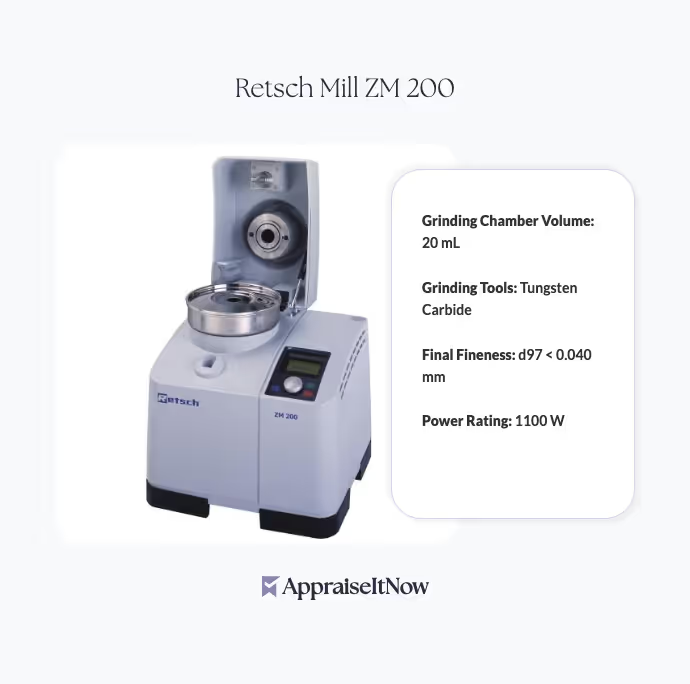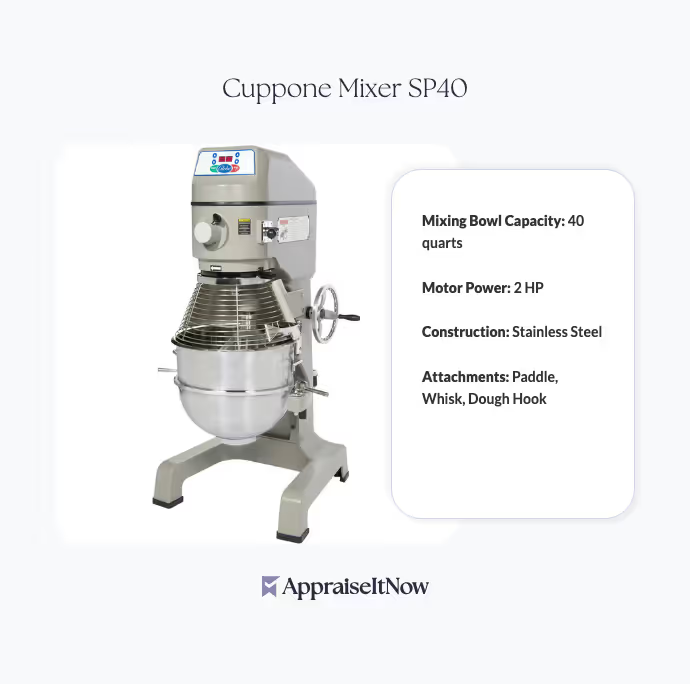<h1>How to Get Your Univex SRM80 Mixer Appraised</h1>
<p>The Univex SRM80 Mixer represents a significant investment for commercial kitchens, food production facilities, and serious collectors of vintage equipment. Whether you're planning to sell, insure, or simply document your equipment's value, understanding the appraisal process ensures you receive an accurate assessment of your <strong>$9,000–$15,000 asset</strong>.</p>
<h2>Understanding Your Univex SRM80's Market Value</h2>
<p>The Univex SRM80 Mixer commands strong market interest due to its exceptional durability, proven reliability, and industrial-grade construction. Introduced in 1960, this commercial workhorse features a powerful 1HP motor, an 80-quart stainless steel bowl, and dual-direction mixing action that makes it ideal for large-scale batch production. The fact that only 500 units were produced worldwide adds to its scarcity and collectibility, positioning it as a valuable piece of <a href="/types/food-processing-equipment">food processing equipment</a> with both functional and collector appeal.</p>
<p>Current valuations range from $9,000 to $15,000 depending on condition, operational history, and original components. The equipment's NSF certification for commercial use and heavy-duty die-cast aluminum construction mean that well-maintained examples hold their value exceptionally well. When compared to similar <a href="/blog/the-value-of-a-professional-restaurant-equipment-appraisal">commercial kitchen equipment</a>, the SRM80's manufacturing pedigree and production scarcity justify its premium market position.</p>
<div class="callout tip"><p><strong>Valuation Insight</strong></p>
<p>An SRM80 with documented service records and original attachments typically commands 15–20% higher valuations than units without complete documentation.</p></div>
<h2>Key Factors That Determine Your SRM80's Appraisal Value</h2>
<p>Several specific elements directly influence how appraisers value your mixer. <strong>Age and production year</strong> matter considerably—original 1960s models often command slight premiums over later production runs, particularly if they're among the earliest units. However, the SRM80's timeless design means that age alone doesn't diminish value like it does with some equipment categories.</p>
<p><strong>Operational hours and maintenance history</strong> form the foundation of condition assessment. Professional appraisers examine whether your mixer has been properly serviced, looking for evidence of regular lubrication, belt replacements, and mechanical tune-ups. A unit with maintenance records demonstrating consistent care typically appraises 20–30% higher than one with unknown history. <strong>Serial number verification</strong> also confirms authenticity and helps appraisers establish the exact production period, which matters for determining specifications and collector value.</p>
<p><strong>Original attachments and accessories</strong> significantly impact pricing. If your SRM80 includes its original bowl, bowl guard, whip attachment, and dough hook, you're looking at a more complete asset that appraisers value more highly than units sold separately. Conversely, missing components or aftermarket replacements typically reduce the final appraised value. The presence of the original stainless steel bowl—a component frequently damaged or replaced—is particularly important for valuation purposes.</p>
<div class="callout note"><p><strong>Documentation Matters</strong></p>
<p>Providing clear photographic evidence and maintenance records accelerates the appraisal process and supports more accurate valuations across <a href="/types/equipment-and-machinery">equipment and machinery</a> categories.</p></div>
<h2>Preparing Your SRM80 for Professional Appraisal</h2>
<p>Before submitting your mixer for valuation, take specific steps to maximize assessment accuracy and demonstrate proper stewardship. <strong>Cleaning and presentation</strong> significantly influence professional impressions—appraisers appreciate equipment that's been well-maintained and presented clearly. You should clean the exterior and interior thoroughly, removing any dough residue, flour dust, or grease buildup. Don't overdo it with aggressive scrubbing that might damage original finishes, but ensure the unit is visibly clean and mechanically sound.</p>
<p><strong>Gather all documentation</strong> before contacting an appraiser. Compile any original purchase receipts, maintenance records, repair invoices, and warranty information. If you've performed maintenance or repairs, include before-and-after photos showing the work completed. Equipment with documented service history appraises 25–35% more confidently because appraisers can verify proper mechanical care rather than making assumptions about operational condition.</p>
<p><strong>Test basic functionality</strong> to verify that your SRM80 operates smoothly through its range. Ensure the motor starts reliably, the bowl rotates properly, and the mixing action engages without unusual noise or vibration. Document this functionality with video if possible, as visual evidence of proper operation eliminates appraiser concerns about hidden mechanical issues that might otherwise reduce valuation estimates.</p>
<h2>How Regional Demand Affects Your SRM80's Value</h2>
<p>Market conditions and geographic location create meaningful variations in Univex SRM80 valuations. Areas with concentrated food production industries—such as major metropolitan regions with large commercial bakeries, catering operations, or institutional food services—typically show stronger demand and higher prices. Similarly, regions with active restaurant equipment salvage communities or commercial kitchen dealers often support premium valuations because local buyers compete actively for available units.</p>
<p>Your location matters when considering <a href="/blog/a-guide-to-navigating-restaurant-equipment-appraisals">restaurant equipment appraisals</a>, as appraisers factor in regional sales data and local market absorption rates. An SRM80 in California's Central Valley, surrounded by commercial bakeries and food processing facilities, may appraise higher than an identical unit in a rural area with limited commercial food production. Professional appraisers using market-comparable sales data from your specific region ensure valuations reflect actual local market conditions rather than generic national averages.</p>
<h2>Documentation and Photographs: What Appraisers Actually Need</h2>
<p>When you submit your Univex SRM80 for online appraisal, providing comprehensive photographic documentation streamlines the assessment and supports more accurate valuation. Professional appraisers need clear images showing the mixer from multiple angles, highlighting any visible wear, damage, or restoration work. Specifically, photograph the <strong>manufacturer's nameplate and serial number</strong> (critical for authentication), the bowl condition including any dents or stainless steel patina, and the motor and control mechanisms from several perspectives.</p>
<p>Include <strong>close-up photos</strong> of any markings, manufacturer badges, or identifying features that distinguish your particular unit. Damage documentation is equally important—if your SRM80 has minor dents, paint chips, or worn components, photograph these clearly with good lighting. Rather than hiding issues, transparent documentation actually supports more confident appraisals because assessors understand what they're evaluating rather than discovering surprises later.</p>
<p>For units with <a href="/blog/food-processing-equipment-appraisal-what-you-need-to-know">complete documentation</a>, include photographs of warranty cards, original manuals, maintenance logs, or any factory literature that accompanied your mixer. These materials add authentic provenance and confidence to the appraised value, particularly important when seeking valuations for insurance or sale purposes. Video demonstrating basic operation and sound quality can also support appraisal accuracy by confirming mechanical health.</p>
<div class="callout tip"><p><strong>Photography Best Practice</strong></p>
<p>Use natural lighting or consistent artificial light when photographing. Avoid shadows across the mixer's surfaces, and include a size reference (like a coin or ruler) in photos to help appraisers understand scale and proportions accurately.</p></div>
<h2>Why Professional Appraisals Matter for Insurance and Financing</h2>
<p>Whether you're insuring your Univex SRM80 or seeking financing against its value, professional appraisals from credentialed experts provide essential documentation. <strong>Insurance replacement coverage</strong> requires certified valuations that insurance companies accept without question—AppraiseItNow's <strong>USPAP-compliant appraisals</strong> meet the highest industry standards and are recognized by commercial property insurers nationwide.</p>
<p>When seeking financing or lines of credit using your equipment as collateral, lenders require professional valuations from independent appraisers. Banks and commercial finance companies won't accept casual estimates or online marketplace pricing; they need documented assessments from credentialed professionals. Similarly, if your SRM80 becomes involved in <strong>legal disputes</strong> (such as estate divisions, insurance claims, or partnership dissolutions), certified appraisals from qualified professionals carry substantially more weight in court proceedings than informal valuations.</p>
<p>Tax purposes create another critical appraisal need. If you're donating your mixer to a commercial culinary school or nonprofit food service organization, you'll need a professional appraisal to substantiate the charitable deduction claimed on your tax return. The IRS specifically requires independent valuations for equipment donations exceeding certain thresholds, making professional documentation essential for tax compliance.</p>
<h2>Understanding Appraisal Methods for Commercial Mixers</h2>
<p>Professional appraisers evaluating your Univex SRM80 use standardized methodologies that consider comparable sales, cost replacement values, and income-generating potential. The <strong>comparable sales approach</strong> analyzes recent sales of similar Univex mixers, adjusting for condition, age, and included accessories to establish fair market value. For <a href="/blog/streamlining-your-equipment-and-machinery-appraisal-process">equipment and machinery</a> with active secondary markets, this method provides the most accurate baseline.</p>
<p>The <strong>cost approach</strong> calculates replacement cost with new equivalent equipment and applies depreciation factors reflecting your mixer's age, wear, and functionality. While a new commercial mixer might cost $18,000–$22,000, your 1960s-era SRM80 depreciates according to established schedules that account for its nearly 65-year history. Finally, the <strong>income approach</strong> (rarely used for mixers unless evaluating a working bakery operation) considers productive revenue the equipment generates, creating a third valuation perspective for comprehensive assessment.</p>
<p>Professional appraisers integrate these methods using their expertise in <a href="/blog/the-essential-guide-to-food-processing-equipment-appraisal">equipment valuation standards</a> and current market conditions. This multi-method approach creates confidence in final valuations and ensures your SRM80 receives fair market assessment regardless of its intended use.</p>
<h2>Online Appraisal Versus In-Person Inspection</h2>
<p>One common question concerns whether certified appraisals require physical inspection or can be completed reliably from photographs and documentation. <strong>AppraiseItNow specializes in remote appraisals</strong> using comprehensive photographic documentation, detailed descriptions, and manufacturer specifications to provide accurate valuations for commercial equipment like your SRM80. For most equipment, especially functional machines like the Univex mixer, high-quality photo documentation combined with honest condition descriptions produces appraisals as reliable as in-person evaluations.</p>
<p>Remote appraisals offer several advantages: faster turnaround times (often 2–5 business days), lower cost because travel expenses are eliminated, and convenience—you don't need to arrange transportation or coordinate schedules with an appraiser. Professional appraisers trained in evaluating equipment from photographs can identify condition factors, wear patterns, and mechanical issues with remarkable accuracy when provided comprehensive visual documentation and detailed descriptions.</p>
<p>However, certain situations may warrant in-person appraisals. If your Univex SRM80 has unusual mechanical concerns, significant restoration work, or complex damage patterns that photographs struggle to capture, a physical inspection by a local expert might provide additional confidence. For most standard condition assessments, though, remote appraisals using <a href="/blog/exploring-the-value-of-beverage-equipment-appraisals">online documentation methods</a> deliver reliable, cost-effective valuations suitable for insurance, sale, and financial purposes.</p>
<h2>Professional Credentials and Appraisal Standards</h2>
<p>When selecting an appraiser for your Univex SRM80, verify credentials in equipment valuation. Look for appraisers holding certifications from recognized organizations such as <strong>AAA (American Association of Appraisers)</strong>, <strong>ISA (International Society of Appraisers)</strong>, <strong>ASA (American Society of Appraisers)</strong>, <strong>CAGA (Canadian Appraisal Group of Appraisers)</strong>, or <strong>AMEA (American Machinery Equipment Appraisers)</strong>. These certifications indicate specialized training, ongoing education requirements, and adherence to professional ethics standards.</p>
<p><strong>USPAP (Uniform Standards of Professional Appraisal Practice)</strong> compliance is essential for appraisals intended for legal, financial, or insurance purposes. USPAP-compliant appraisals follow rigorous methodologies, require written explanations of valuation conclusions, and meet the highest professional standards. AppraiseItNow connects you with credentialed appraisers who maintain current USPAP certifications and specialize in <a href="/blog/how-to-choose-the-right-appraiser-for-your-equipment-and-machinery">equipment and machinery appraisals</a>.</p>
<h2>What Professional Appraisals Include</h2>
<p>A comprehensive Univex SRM80 appraisal report includes detailed condition assessment, historical research, comparable market analysis, and a final certified valuation. The report documents your mixer's specifications (motor type, bowl capacity, construction materials), production year, serial number, and condition grade using standardized terminology. Professional appraisals include photographs documenting the equipment's current condition, detailed descriptions of wear patterns or damage, and documentation of any accessories or components.</p>
<p>The valuation section explains the appraiser's methodology (comparable sales analysis, cost approach, or combined approach), identifies comparable equipment sales that informed the valuation, and adjusts for condition differences. Finally, the report includes appraiser credentials, certification statement, and disclosure of any limiting conditions. This comprehensive documentation creates a defensible valuation suitable for insurance claims, sale transactions, legal proceedings, or tax purposes.</p>
<h2>Typical Turnaround Times and Costs</h2>
<p>Professional Univex SRM80 appraisals typically complete within 2–7 business days depending on complexity and current appraiser workload. Remote appraisals using photograph documentation generally complete faster than in-person evaluations because they eliminate travel time and scheduling coordination. AppraiseItNow's online platform accelerates the process—you submit photos and descriptions, specialists review your documentation, and appraisers provide certified valuations efficiently.</p>
<p>Appraisal costs for commercial equipment like the SRM80 typically range from $300–$600 for remote valuations, depending on complexity and the appraiser's experience with food processing equipment. In-person appraisals cost more due to travel expenses and technician time. Most professional appraisers charge flat fees for equipment valuations rather than percentage-based fees, ensuring cost transparency. Your investment in professional appraisal typically returns value through accurate insurance coverage, confident sale pricing, or documented asset values for financial or legal purposes.</p>
<div class="callout note"><p><strong>Key Takeaway</strong></p>
<p>Professional appraisals of your Univex SRM80 Mixer provide certified documentation that insurance companies, lenders, and legal professionals accept with confidence. By gathering quality photographs, maintenance records, and accurate condition descriptions, you enable appraisers to deliver fair market valuations that accurately reflect your equipment's worth in today's market. Whether you're buying, selling, insuring, or documenting your mixer for financial purposes, certified appraisals from credentialed professionals protect your interests and ensure you understand your asset's true value.</p></div>
